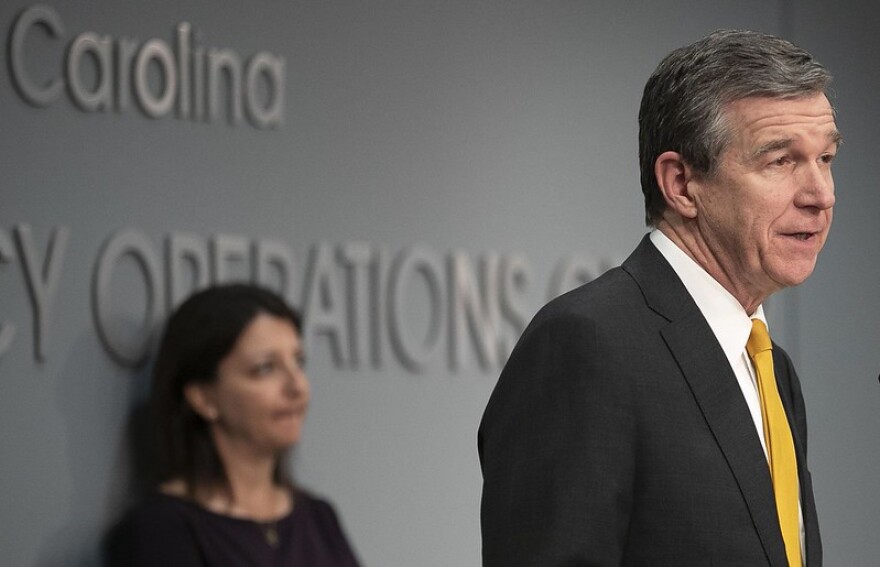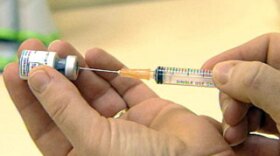A coalition of more than two dozen media outlets – including North Carolina Public Radio – filed a lawsuit on Thursday seeking the release of a list of records related to COVID-19 that the state had, so far, refused to provide.
The lawsuit names as defendants Gov. Roy Cooper and two of his Cabinet secretaries, Dr. Mandy Cohen, secretary of the Department of Health and Human Services, and Erik Hooks, secretary of the Department of Public Safety.
The complaint lists a total of 26 outstanding records requests — nine to DPS and 17 to DHHS — submitted by media outlets for records that could be helpful in reporting on COVID-19. All but one of the requests were submitted since the pandemic began.
Among the records listed in the lawsuit are: the state's database of COVID-19 cases, with personal identifying information removed; the database maintained by the state office of Emergency Management to track requests for personal protective equipment and other supplies by hospitals and local governments; copies of reports of prison inspections conducted during the pandemic; communication between officials at DPS and DHHS; and communication from DHHS officials to local health departments.
Asked about the pending lawsuit during his press briefing on Thursday, Cooper said his office was committed to following the state's Public Records Act, which requires production of all public records unless those records are specifically exempt by law.
"Number one, we want to make sure that we comply with the public records laws and I want to make sure that every agency in state government does that," Cooper said. "Number two, this administration is making a lot of data available, particularly as it relates to COVID-19 and working hard to make sure that data is available more and more every single day."
Cooper also said state employees were "stretched to the max" during the pandemic.
For weeks, attorneys for the media organizations have talked with lawyers at each agency in an effort to resolve many of the requests without having to file a lawsuit. But the agencies largely haven't followed up with the requested records.
A media coalition had previously threatened to file a lawsuit seeking information regarding COVID-19 cases in nursing homes. But DHHS agreed to start releasing information identifying facilities with reported outbreaks, making a lawsuit unnecessary.
DPS spokesperson Pam Walker said Thursday afternoon that her agency had not yet been served with the lawsuit nor had the opportunity to review it. But she noted that DPS was one of the lead agencies responding to "an extraordinary and unprecedented event."
"DPS will continue to respect the importance of providing public records and responding to requests for information," Walker said in an email. "It will provide all public records as promptly as possible, despite the very challenging times we are in."
At his press briefing Thursday, Cooper said he would ask his chief of staff to get him a list of outstanding records that his administration had not yet fulfilled.
"I want to make sure that these agencies respond to the requests," Cooper said. "If they say they are not going to get it done, there better be some reason under the law that they're not going to do it because I want to see these records provided."
Jim Thomas, an epidemiologist and associate professor at the UNC Gillings School of Global Public Health, has said in a previous interview regarding DHHS's refusal to release information that transparency is critical during a public health crisis.
"One of the things that's most important to the execution of public health is trust," Thomas said in an interview Thursday. "Trust in the public to work with the government in what it's saying needs to be done. Ours is not an autocratic society. We don't force people to do things. There's a lot of voluntary activity that's involved."
Thomas' sentiment is echoed in the Centers for Disease Control and Prevention's field epidemiology manual, which includes an entire chapter devoted to communicating with the public during a public health investigation.
"From the beginning of an event to its resolution and follow-up, public health authorities are expected to provide the news media with timely, accurate information and answers about the outbreak's effects," the CDC manual says.
The manual goes on to say that communicating during a public health investigation is key to gaining and maintaining the trust of the public. That trust may determine whether the public follows the advice and guidelines of health officials going forward.
"Trust and credibility can greatly influence your ability to persuade affected persons to follow public health authorities' recommendations during an outbreak or public health response," the manual says. "The ability to contain and stop the outbreak might hinge on established relationships and coordination with key partners and stakeholders."
This story was jointly reported and edited by Kate Martin and Frank Taylor, of Carolina Public Press; Ames Alexander, of The Charlotte Observer; Aaron Sánchez-Guerra and Jordan Schrader, of The News & Observer; Nick Ochsner, of WBTV; Emily Featherston, of WECT; Tyler Dukes, of WRAL; and Jason deBruyn, of WUNC-FM.








